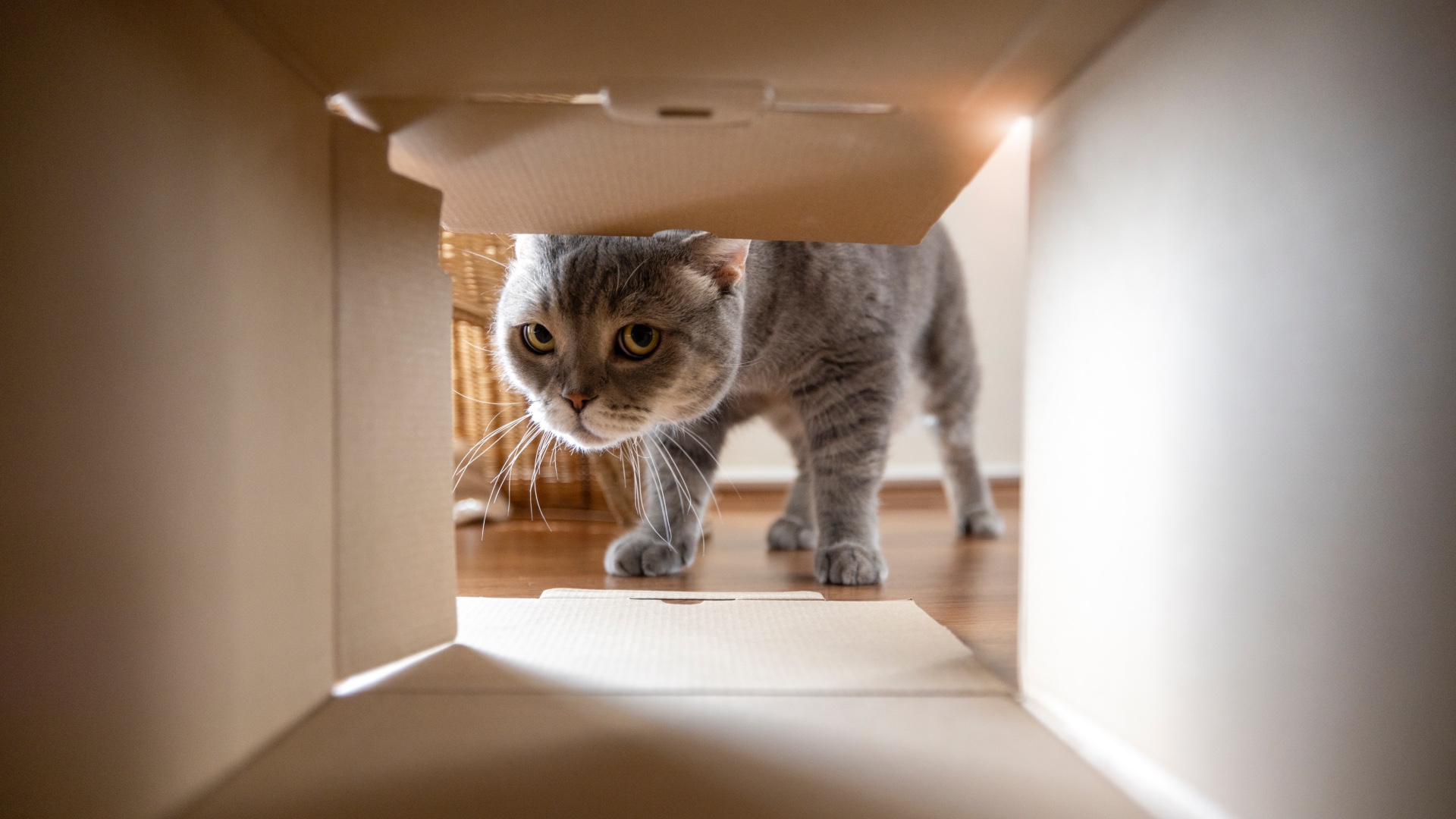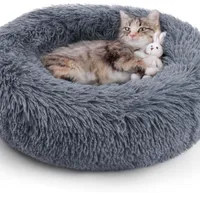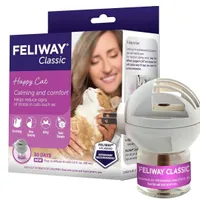What is anxiety in cats? We spoke to a vet to find out
Anxiety in cats is more common than you might think. Here's everything you need to know....

Get the best advice, tips and top tech for your beloved Pets
You are now subscribed
Your newsletter sign-up was successful
Anxiety in cats is caused by the anticipation of a danger or threat. This means that even when your feline friend isn’t in any real danger, they can experience behavior changes and bodily reactions that you may find concerning as a pet parent.
Anxious cats will often have symptoms such as an increased heart rate and you may notice them panting or trembling. If you’ve ever found yourself asking the question ‘why is my cat overgrooming’, this sort of behavior, alongside hiding and excessive vocalization, can all indicate that your kitty is feeling stressed.
While things like the best calming cat collars and pheromone diffusers can be helpful in reducing stress and anxiety, the first step when dealing with an anxious cat is to figure out what’s causing them to feel that way.
To help you do that, we consulted expert vet Dr. Rebecca MacMillan. Below, she explains the most common causes of anxiety in cats. Plus, she shares the signs to be on the lookout for that may indicate your kitty is feeling anxious, when to see a vet, and some simple things you can try at home to help calm your cat. Let’s take a look…
What are the signs of anxiety in cats?
"Cats can show anxiety in different ways," explains Dr. MacMillan. "In some cases, it can be very obvious with the affected cat being much more scared or aggressive.
They may also show other symptoms like stress-induced cystitis which can cause them to urinate outside of the litter box. Overgrooming is also a common feature in a stressed cat, with areas of their fur looking more thin than normal.
However, some anxious cats may be much more subtle than this. A cat hiding under the bed, for example, could also be a sign that they're feeling stressed.
Get the best advice, tips and top tech for your beloved Pets
"They could hide away more than usual, interact less, and only come out to eat or toilet when they feel safe," Dr. MacMillan confirms.
What are the causes of anxiety in cats?

1. Illness/physical pain: Is my cat sick? If they are, it's possible they could be feeling anxious. "An unwell cat may be more stressed than normal, especially if they are in pain," says Dr. MacMillan. "These cats generally won’t like being handled especially if you touch the sore area."
2. Separation anxiety: Separation anxiety in cats is much less common than in dogs, however it can still happen, particularly if you have one of the cat breeds most likely to suffer from separation anxiety (such as the Burmese or Siamse).
"Some cats may not like it when they are left at home alone, especially if they are used to having you around most of the time," explains Dr. MacMillan, adding that. "boredom could be a factor too."
3. Improper socialization: "A cat that hasn’t been properly socialized as a kitten is much more likely to be stressed and anxious as an adult cat," Dr, MacMillan says. "Introducing a kitten to different sights and sounds when they are very young is crucial to their socialization."
Here's how to socialize a kitten if you're looking for some helpful tips to get you started.
4. Changes to their environment: Have you recently moved house? Do you have guests staying? Are you in the midst of trying to introduce a kitten to a cat? According to Dr. MacMillan, all of these things have the potential to cause anxiety.
"A house move, building works or even a new sofa may cause some cats anxiety. New people or animals in the house can also be seen negatively. Cats are very territorial animals so change can be a big stressor for them."
5. Competition for resources: "If your cat lives in a multi-cat household, competition for resources like food bowls and litter trays can cause your cat to feel anxious," explains Dr. MacMillan. "It is important to have one resource per cat plus an extra one to avoid confrontation (i.e. for 2 cats you would provide 3 litter trays)."
This ultra-soft donut-shaped bed features a raised rim to help create a sense of safety and security. It's also machine washable and comes in a range of colors.
Diagnosing anxiety in cats

Concerned your feline friend may be suffering from anxiety but not sure what to do about it? Dr. MacMillan says it's important to first get them checked over by a vet to ensure it's anxiety, and not something else, that's causing their symptoms.
"Sometimes it can be unclear whether your cat is anxious or whether there is something else going on," she says. "For instance, a cat urinating outside of the litter tray could be stressed or they could have a urinary tract problem. Your vet will start by examining your cat and looking for any signs of pain or disease. If found, they will suggest appropriate investigation or treatment.
Your vet may advise tests like urine samples or blood samples in some cases. If everything else is ruled out and they are diagnosed with anxiety, then your vet may be able to suggest calming supplements to help your cat. They may also refer you to a qualified pet behaviorist if you are struggling with your cat’s behavior."
What to do when your cat is anxious
Figuring out how to calm a cat during periods of high anxiety can feel challenging, but the first step is to see if you can work out what's causing them to feel anxious in the first place.
"If you can identify what is causing your cat stress, then taking steps to improve the situation can help a lot," says Dr. MacMillan. "For example, if you have multiple cats and not enough litter trays around the house, this is easily solvable.
It can be trickier in unavoidable situations like a house move or new family member. In this scenario, try using ‘feel-good’ calming pheromones in the environment or consider a vet-recommended supplement to naturally calm your pet.
You should also ensure they have plenty of places to hide, and never force them to come out and interact with you. If they do choose to come to you, provide them with plenty of reassuring TLC.
You could also consider speaking to a qualified pet behaviorist for advice, but this is only usually recommended after a vet has ruled out any other health problems first."
FELIWAY Classic Cat Calming Pheromone Diffuser 30 Day Starter Kit
Recommended by vets, FELIWAY mimics the natural feline facial pheromones to help reduce common signs of stress in cats.
Read next: Signs your cat is stressed and sign of grief in pets

Rebecca is a vet surgeon who graduated from the Royal Veterinary College in 2009. She has a wealth of experience in first opinion small animal practice, having done a mixture of day-to-day routine work, on-call emergency duties and managerial roles over the years. She enjoys medicine in particular and she is proud to have recently achieved a BSAVA postgraduate certificate in small animal medicine (with commendation). She writes on various feline and canine topics, including behavior, nutrition, and health. Outside of work and writing she enjoys walking her own dog, spending time with her young family and baking!

Kathryn is a freelance writer who has been a member of the PetsRadar family since it launched in 2020. Highly experienced in her field, she's driven by a desire to provide pet parents with accurate, timely, and informative content that enables them to provide their fur friends with everything they need to thrive.
Kathryn works closely with vets and trainers to ensure all articles offer the most up-to-date information across a range of pet-related fields, from insights into health and behavior issues to tips on products and training.
When she’s not busy crafting the perfect sentence for her features, buying guides and news pieces, she can be found hanging out with her family (which includes one super sassy cat and a kitten), drinking copious amounts of Jasmine tea and reading all the books.
She has written for a range of publications, including Fit&Well, Top Ten Reviews, LiveScience, Goodto, and Product Hunt.


